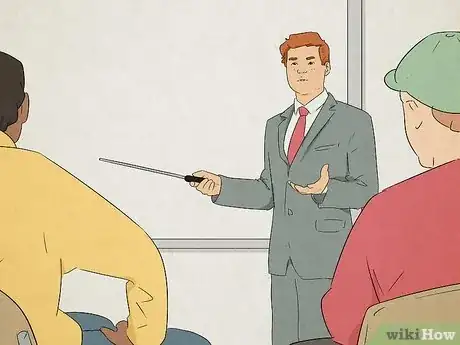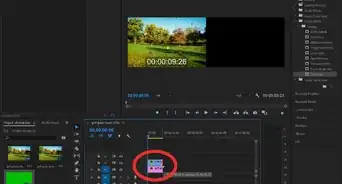This article was co-authored by Melessa Sargent. Melessa Sargent is the President of Scriptwriters Network, a non-profit organization that brings in entertainment professionals to teach the art and business of script writing for TV, features and new media. The Network serves its members by providing educational programming, developing access and opportunity through alliances with industry professionals, and furthering the cause and quality of writing in the entertainment industry. Under Melessa's leadership, SWN has won numbers awards including the Los Angeles Award from 2014 through 2021, and the Innovation & Excellence award in 2020.
There are 11 references cited in this article, which can be found at the bottom of the page.
wikiHow marks an article as reader-approved once it receives enough positive feedback. This article has 12 testimonials from our readers, earning it our reader-approved status.
This article has been viewed 160,385 times.
Getting your great idea on paper and getting it on screen are two totally different beasts. And they are both incredibly difficult. But that is because people don't realize that they are separate skills. The modern writer needs to become a salesperson instead of trying to sell their "perfect" idea as a writer.
Steps
Preparing a Good Idea
-
1Understand what makes a great idea in Hollywood. Development executives, the people who review ideas and choose what gets made, are constantly bombarded with ideas. To stand out you need to know what kind of ideas are going to capture their attention. While there is no perfect formula for an idea, there are some common threads among the best ideas:
- Originality: The hardest, but most crucial, factor of any idea. Luckily, pure originality isn't necessary. You want something that looks like it could sell -- a new mix-up of old ideas, a beloved book or story that hasn't been filmed, a new perspective people haven't seen, etc.
- Projected Cost: Especially if this is your first idea, you'll generally want to steer away from the enormous, effects-driven blockbusters. Few studios will risk hundreds of millions of dollars on an unproven filmmaker. You're better off using fewer characters and simpler settings whenever possible.
- A Screenplay/Proof of Concept: Do you just have the idea, or do you have something to back it up? This can be a screenplay or a short film, but it is essential nonetheless. The idea will get you in the door, but it is the content that will get the movie/show made.
-
2Create a clever log line. A log line is a single sentence that outlines the basic premise and hook of your concept. It details the characters, plot, and setting briefly so that you can interest someone in the idea with just 1-2 sentences. Keep it as short and dynamic as possible. Some ideas from famous movies include:
- Back to the Future: Marty, a high school student, is accidentally transported to the past, where his parents are at risk of never falling in love -- or creating him![1]
- Jaws: A police chief with a phobia for open water battles a killer shark. But the greedy town board refuses to admit there is a problem at the beach at all.
- Ratatouille: A Parisian rat secretly teams up with an untalented chef to prove that anyone can cook, though jealous critics and pest-control think otherwise.[2]
Advertisement -
3Draft up a synopsis. Synopsis are 1-3 page documents that tell your entire story/first season, beat for beat. You want to include the genre (Romantic Comedy, Action) the characters, and the plot in quick, concise, and engaging prose. For reality shows, this is a breakdown of the setting, people, and possible plot lines to follow. This is easier said than done, but a good synopsis will contain:
- As few words as possible. Get to the point, and get out. You want to tell the story clearly and quickly, so avoid long, unnecessary things like "Gary is tall, blond and young, but he look like he is 50. He likes to smoke and listen to rock and roll, and..." These details are unnecessary and will likely all change.
- Action verbs and phrases. Avoid, "she does this," "he responds with," and other overused or nondescript verbs. Aim for powerful, action-oriented verbs, like "she battles," "he retorts with," whenever possible.
- Characters. You don't want a list of plot elements, you want a movie. Characters drive audience investment in film and TV, so don't forget about them. The plot should be sparked by your characters, not the other way around.[3]
-
4Get the rights of anything based on a real event or person. Having the rights to something is often the difference between a deal and the door. Luckily, they are actually easy to get. Development executives often comment that they want things "Based on a True Story." Owning someone's "Life Rights," means that you can't get sued for making a movie based on their "true" story. Just as importantly, you get the exclusive rights to make the movie or TV show, as only one person can hold the rights to something at once. Usually, you buy life rights cheaply, sometimes for $1, and then split profits once the show or movie is made.
- Life rights can include biographies, such as getting a musician's life rights or the rights to the people involved in a large murder trial.
- Life rights can also include reality shows. Find a compelling family, mini-celebrity, or person worth exploring every day. A cheap set of life rights may turn them into a lucrative show.
- If you want to adapt a book, you must purchase the rights before selling your idea. To do so, contact the publisher located in the front of the book.[4]
Knowing Where to Pitch
-
1Research current networks and development reports. Subscribe to Hollywood trade publications ("the trades") and websites, like the ubiquitous Deadline.com (a must-read), to get a handle on what's being developed and produced by a studio or network. For example, Deadline reported last year that NBC was pushing big on medical dramas. What does that mean for you? That this year medical dramas are a lot less likely to sell, as NBC is currently developing 5-6 of them.
- Visit the directories to get the complete list of industry contacts, cross-referenced by company, name, and show, and keep notes of names that are frequently attached to projects like yours.
-
2Create a "hit-list" of appropriate companies to approach. Once you know what studios are producing similar ideas make a list of all the relevant companies. Find out if they accept unsolicited pitches. The best way to do this is through their website. Find phone numbers, emails for assistants, and anything that talks about idea generation (such as "how to pitch").
- This is largely a matter of common sense. You wouldn't pitch a cheesy monster movie to NBC, you'd send it to SyFy. You wouldn't send over a period drama to Judd Apatow's production company. Think about what the studio is already making to pitch to the right people.[5]
- Many studios have fellowship programs. These are paid 6-8 week programs that help you develop and hone your ideas. They are, however, incredibly competitive and pay very little.
-
3Network with everyone you can. Meeting people is still the number one way to sell an idea. Whenever you meet someone who is even tangentially involved in making films, set up a time to get coffee together. Even if this person isn't able to make your idea a reality, they may know someone who can. That said, do not make friends simply to try and get famous -- just be your normal, friendly self and offer up your ideas organically.
- When possible, work on film and TV sets as a production assistant, intern, or extra.[6] You'll meet many industry contacts who may need a new idea for their next project.
- If you've published before, or have industry experience, you could consider hiring an agent, though it is not strictly necessary.
- While not strictly necessary, selling your idea to Hollywood is easiest if you're in Hollywood. If you're serious, it's time to move to LA.
-
4Consider sending your idea through a pitching service. These sites, which charge you a nominal fee to host and "directly" pitch your idea to development executives, have a spotty track record. Yet some of them, like The Blacklist, have launched careers and ideas before. Be sure to thoroughly vet a pitching service before sending them money.
- Research any of their "success stories" online and on IMDB to see how the projects went.
- Search for online testimonials. Many screenwriting and film sites allow people to comment on the effectiveness of an company.
- Get and keep verification and proof of your idea from any company you send to. This can prevent theft later on and make sure your idea stays yours.
-
5Make the idea into a movie/show yourself. If you show someone a trailer or a short cut of footage, you immediately capture their attention and show that you mean business. This is a great way to get funding as well, and it is always easier to get funding if you already have it. Some ideas include:
- A crowd-sourcing campaign to shoot your first episode, scene, or promo.
- A blog detailing your work on the idea.
- Storyboard, scripts, or animatics.
Selling Your Idea
-
1Know that you'll need an effective pitch to sell your idea. More likely than not, you'll need to pitch your idea again once Hollywood executives bring you in. There are a lot of different stages that need to OK your idea before it gets made, and not all them have time for advance research on your idea. You need to enter ready to knock them out.
- You should always prepare your pitch and practice it well in advance. Your idea was revised and honed to perfection, your pitch needs to be, too.
-
2Become a salesperson, not a writer. Development execs hear hundreds of ideas a day, and they are often phrased: "I have a good idea, I'm a good writer, and the world is ready to hear it." While this may be true, you are not defending your art, you are selling it. You should be talking about why they need to buy it. How does your idea benefit them and their viewers? Why is it the right fit for them? Check your ego at the door and become a salesperson if you want success.
- This is where your research comes in handy. You need to know what kind of movies/shows the company produces, and who its audience is, to best capture its attention.[7]
-
3Pitch quickly and energetically. Your pitch should fit in under 5-10 minutes. These people do not have a ton of time, and they hear a lot of pitches each day. You want to make sure you capture their attention immediately get to the point shortly after. A good structure to consider includes:
- A Hook: How do you grab their attention? This is usually with the log-line you developed ahead of time-- the one sentence hook that describes your show or movie and draws people in. A good way to think of this is, "What is the "What if?" of your idea?"[8]
- The Audience: Who is this show marketed to? How does it fit perfectly into the network or studio's existing audience?
- The "Trailer:" Think of any great movie trailer. What are the elements that make you want to go buy a ticket? Come up with these moments, the selling points, for your idea, and use them to paint a fuller picture of your movie or show.
- The Budget (Optional): If you are convinced that you know the budget, roughly, for the show/movie, bring it along. Especially if it is low. This shows you know how the production game works, and that you can give a specific dollar amount on the deal. Again, this is only effective if the idea is low-budget.[9]
-
4Have 4-5 more ideas on hand. A development exec may like your voice and idea but pass on the show for a variety of reasons. In this event, they will usually ask some variation of "do you have anything else you're working on?" This is not the time to freeze up, it's the time to have a few more ideas in the tank to test out. Never walk in with all of your ideas in one egg basket, as this will severely limit your chances of signing a deal.[10]
-
5Hire an entertainment lawyer to review any deal before signing. You may have heard about "getting an agent," but you want a lawyer nearby for the deal. Agents take 10% of the cut and have no legal experience in deal-making, while an entertainment lawyer has vast experience in contract negotiations. Most lawyers will take a nominal fee with minimal participation in any additional revenues. Some will just take a cut of the option money and 5% of all revenues.
Community Q&A
-
QuestionHow can I protect myself from someone stealing my movie idea once it has been pitched?
 Community AnswerYou should notarize or register your story before you pitch it.
Community AnswerYou should notarize or register your story before you pitch it. -
QuestionHow can I find the expert writers from Hollywood?
 Community AnswerYou can contact an agency to find you a good writer, or try to contact a writer who has been successful and whose work you admire.
Community AnswerYou can contact an agency to find you a good writer, or try to contact a writer who has been successful and whose work you admire. -
QuestionIs there any website or company that can help me sell my film ideas to the right people?
 Stanley KubrickCommunity AnswerSubmit your screenplay to a screenwriting contest. Most of them offer to give the winning one to a producer.
Stanley KubrickCommunity AnswerSubmit your screenplay to a screenwriting contest. Most of them offer to give the winning one to a producer.
Warnings
- Only pitch an idea when asked. No one, especially busy executives, likes being constantly barraged by "great" movie or TV ideas.⧼thumbs_response⧽
References
- ↑ http://www.indiewire.com/article/how-to-write-the-perfect-logline-and-why-its-as-important-as-your-screenplay?page=2
- ↑ http://www.movieoutline.com/articles/writing-good-log-lines.html
- ↑ http://www.writersdigest.com/editors-picks/learn-how-to-write-a-synopsis-like-a-pro
- ↑ http://www.earlytorise.com/how-to-sell-movie-ideas-to-hollywood/
- ↑ http://www.scriptmag.com/features/producers-pov-how-and-where-should-i-pitch-my-tv-show
- ↑ Melessa Sargent. Professional Writer. Expert Interview. 14 August 2019.
- ↑ http://www.scriptmag.com/features/producers-pov-how-and-where-should-i-pitch-my-tv-show
- ↑ http://www.josephfinder.com/writers/tips/whats-a-hook-the-art-of-the-pitch/
- ↑ http://www.indiewire.com/article/how-to-develop-a-pitch-an-excerpt-from-the-hollywood-pitching-bible











































































